Prime Minister Mottley delivered Barbados’ national statement to the General Debate of the 77th session of the United Nations General Assembly on Thursday afternoon. You may watch the Prime Minister’s statement via the YouTube link below:
If the YouTube window does not appear above, click here.
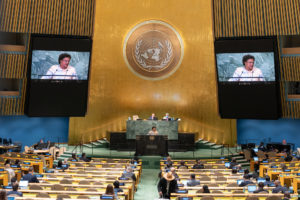
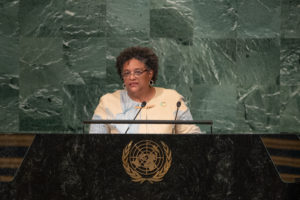

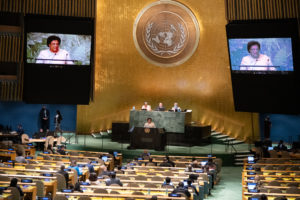
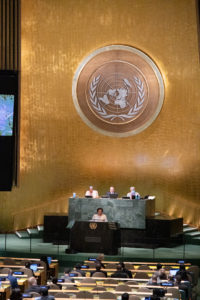
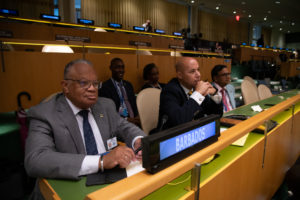
Transcript of the Statement by the Honourable Mia Amor Mottley, S.C., M.P., Prime Minister of Barbados, at the United Nations General Debate, 77th Session
Thursday, September 22, 2022
Thank you very much Mr. President.
I would like, first of all, to congratulate you on your election to this Honourable Assembly as its president and as I do so, I want to at the outset thank the courageous leadership and commitment in very difficult times of our Secretary-General, Antonio Guterres, and the Deputy Secretary-General, Amina Mohammed.
This year, we come again and the battles continue. Indeed, they have been enhanced. What we have seen over the course of the summer and what we have seen over the course of this year with the war in Ukraine and the concomitant consequences to ordinary people all over the globe with respect to inflation; with respect to scarcity of supply of goods; with respect simply to hardship. Access to food, continues regrettably, to be the environment within which we live.
I had hoped that we would have seen improvement, but I am now convinced more than ever that there comes a time when we must heed a certain call, as was said when others before us – when I was a student – sought to fight the great famine in Africa and came together as one world to make that definable difference.
Last year I asked us to do the same. And maybe it is, in the words of Jimmy Cliff, that we have to keep trying and trying and trying. But the world must stand up if our citizens are to live a better life. I say so today because it is easy to come only and complain, but the truth is that it is within our power to be able to make that difference and that definable change.
And we must decide whether we want to stand for peace and whether we want to stand for love and whether we want to stand for prosperity – knowing that we choose to do so at the most difficult time and from the most difficult and deep place that we can do so in a very, very long time.
I believe it is possible.
But it is up to us to change possibilities into realities. What do I mean?
Mr. President, we have been speaking for a long time about the reform of this institution and about the recognition that there were only a quarter of the states that now it exists when this institution was formed.
Earlier this week, President Biden spoke of the need to reform the Security Council. We call and echo for that. But we go further because we believe that a Security Council that retains the power of veto in the hands of a few will still lead us to war, as we have seen this year. And therefore the reform must not simply be in its composition, but also be in the removal of that veto.
We also believe that the recognition of the G7 countries and the G20 countries as the informal subcommittee of governance of this world, if it is to be fair, must recognize that no longer can we accept that persons call year after year after year for the inclusion of the people of Africa and African descent to be included in the G7 and G20. For how can a world have at its core, a subcommittee that excludes more than 1.4/1.5 billion people of the world and expect it to reflect fairness and transparency in its decision-making?
We ask that the determination be made by those countries who must understand that if we are to move from possibilities to realities, we must embrace a transparent framework that allows our people who are losing faith in their institutions and in the governance of this world to understand that fairness means something; that fairness means the ability for all to have a voice. And that we can’t only speak to it within the corridors of democracy, within the nation state, but it will only mean something when it also is reflected in our international community. And if I perhaps have one simple theme today, it is that that fairness and that togetherness is what is needed to bring about peace, love and prosperity in this world.
And no, this is not romanticism. These are hard realities that simply require decisions. And that is why I use that language from that great anthem, “We Are the World”.
That there comes a time when we heed a certain call when the world must come together as one. Yes, regrettably, there are too many people dying – in conflict as a result of the current crisis and the hand that we must lend to life comes in the decisions that we must make to reform and to fight for peace, not to fight to sustain war – wherever it is found across this world – to fight for reform so that our citizens are not made victims of poverty because of the triple crisis of climate, of pandemic and indeed now of the conflict that is leading to the inflationary pressures that leads regrettably to people taking circumstances into their own hands, as we have seen in Haiti in the last week.
Any attempt to increase fuel prices, any part of the world, by 150% would have been met with great consternation and anger by populations on fixed income. And when that happens in one of the poorest countries in the world that has been trying for almost 230 years to find stability, and against the backdrop of exploitation that it has faced, we ask ourselves: to what end will the world stand up and be counted for the people of Haiti?
Similarly, we ask for the same transparency to occur with respect to the removal of the blockade against the people of Cuba. This is the 30th year that the resolution has called for that removal of that blockade, but it has been there for 60 years. And I say simply to the people of the United States of America, do not be short-sighted in your goals. For in this hemisphere, peace and prosperity is a province of all.
And yes, there may be problems on both sides, but there is nothing that justifies further hardship to people because of ideological differences. And if there are human rights differences, let us resolve them, as we have chosen to do with mightier countries across the world without the imposition of sanctions.
Fairness and transparency demand it of us.
But I also want to talk to you about other solutions that we believe can alter our condition without imposing burdens of taxation unreasonably so on the populations of the world.
We live in a world, as I said last year, where the disparity in income is too great. And we live in a world where some are even benefiting from the crises disproportionately and egregiously. And we must ask ourselves, therefore, whether the time has not come for a review of the settlement of the Bretton Woods institutions that no longer serve the purpose in the 21st century that they served in the 20th century; that they served when they were catering to a quarter of the nation states that are now members of this august institution.
We ask ourselves whether the time has not come for our voices to act collectively, to demand that, through the boards of directors of the respective institution. And why do I say so?
The International Bank for Reconstruction and Development is really what the World Bank is. And maybe if we referred to that continuously, we would remind ourselves that the purpose of reconstruction and development must be appropriate to the century in which we live. And the century in which we live does not only demand of us the eradication of poverty, which remains a noble goal, but it demands of us, equally, the protection of global public goods.
All of us in here have suffered as a result of the weakest of us being unable to rise to the occasion for the protection of public health. All of us in here, now know what it is to be on the frontline of the climate crisis.
Years ago, we spoke about Small Island Developing States on the front line because we were the canaries in the mine. Today we speak of all countries. And this hot, hot summer – with wildfires from California; the heat waves in North America and Europe; to waterways in Europe being prohibited from the ability of vessels to traverse it; to floods in China and above all else; the apocalyptic floods in Pakistan for which our heart goes out to the people of that country.
It simply cannot continue.
And any attempt to deny that the climate crisis has manmade origins is an attempt to delude ourselves and to admit that we want to be accomplices in the continued death and loss and damage that ensues to the people who are the victims of it. Our people demand better of us.
We believe, today, that the most appropriate place to deal with global public goods is, in fact, the World Bank Group. And I will speak more to this tomorrow, but I want to simply say that if companies, multinational companies, have contributed to the global public risks or benefit from the solutions for global public goods, then they ought to contribute to their resolution through a percentage, a small percentage of their profits, funding the needs of countries – whether it is in the issue of climate; stability and resilience and adaptation; whether it is for the protection of biodiversity both on land and in our waters; whether it is for the protection of public health against the next pandemic (the slow motion pandemic of antimicrobial resistance or others that we have not even contemplated); or the provision of education for each of our citizens, because to remain on this earth without the benefit of education is to be sentenced to life imprisonment from a young age; or access to electricity as 600 million people in Africa do without it; or the equivalent to the right to knowledge and prosperity in our age, that is access to broadband; and of course, as I said to Congress last week, believe it or not, the right to a bank account, because countries across the world are being denied the right to access correspondent banking and leaving their citizens and their economies to function as financial pariahs in a world that is supposed to be globally interdependent for the movement of capital.
My friends, the provision of that fund to promote public goods at a global level is critical if we are to make a difference going forward, and to achieve the peace, the love and the prosperity to which I referred.
I want to commend the International Monetary Fund for their rapid financing mechanism at the beginning of the pandemic crisis. And soon, for the Resilience and Sustainability Trust (RST) that is about to be launched – that is a first recognition that middle income countries should be able to access funding irrespective of per capita income, but dependent on climate vulnerability. And we say, that for those who commend it to the International Bank for Reconstruction and Development, do not simply commend it for countries following a disaster, but let us do it for countries before the disaster – for every dollar spent as they have researched, saves $7 in avoided expenditure, not to mention the lives that are saved.
We don’t want only to pay the undertaker, we want to save lives.
But I ask the IMF to reflect on the fact that that Resilience and Sustainability Trust may need to be delinked from quotas if it is to be effective. I am conscious that that will depend on more countries seeding that fund with capital and more countries agreeing perhaps to allow their Special Drawing Rights (SDRs) to be used there, just as we asked them to allow those Special Drawing Rights to be used to allow multilateral development banks to significantly increase the money that is available to countries, particularly at this time, as we are on the verge of a debt crisis where more than 45 countries are facing the heat of the moment because of the increased cost of capital, as a result of the monetary policies that are being put in place to fight the virulent cancer of inflation.
I say now that we want to thank those countries that have come together to help us continue for the financing of Sustainable Development Goals. And we link what goes to the global public goods. Why? Because they’re fundamentally, the right to development. They are fundamentally the right to give each person the ability to live a good life. And we can’t be lost in the conflict and lost in the climate crisis and lost in the pandemic, and forget fundamentally what our mission is.
I commend those who continue to remember that.
But I ask for us to reach a global compact – that financing for development cannot be short-term financing, and that it needs to be at least 30-year money. The world recognized that when it allowed Britain to be able to participate in the refinancing of its World War bonds which were only paid off eight years ago, 100 years after World War One started.
Or when it allowed Germany to cap its debt service at the equivalent of 5% of its exports, conscious that the cataclysmic experience of war would not have allowed them to finance reconstruction while repaying debts incurred for war.
My friends, we are no different today.
We have incurred debts for COVID. We have incurred debts for climate. And we have incurred debts, now, in order to fight this difficult moment with the inflationary crisis and with the absence of certainty of supply of goods. Why, therefore, must the developing world now seek to find money within 7 to 10 years when others had the benefit of longer tenors to repay their money?
I want finally to deal with the issue, very quickly, and to suggest to you that all of these things have been the subject not just of idle thought or arbitrary comment on our part. We had the good fortune of collecting in Barbados a large number of persons from civil society in academia at the beginning of August, end of July. And we settled on what we have come to call the Bridgetown Agenda, because we believe it to be a Bridgetown Agenda for peace, a Bridgetown Agenda for prosperity, a Bridgetown Agenda inspired by love of humanity. And it is that agenda that speaks to the reform of the Bretton Woods architecture.
We’ve asked and will ask countries and people to join it because we believe that unless we take responsibility for ourselves, unless we accept that we are the world, we’re not going to see a change. And as I come to simply this issue of climate which will dominate us over the next 45, 48 days as we go to Egypt, let us remember that the trust that is needed to propel us to fight the great causes of our time will not be won by us breaching promises.
The developing world, and in particular the Small Island Developing States came to Paris and agreed for a global compact. One of the key aspects of it that allowed us to do so, was the promise of loss and damage.
Today, the people of Guadeloupe and Puerto Rico. Yesterday, Turks and Caicos. And little do we know what will happen with Bermuda – faced the difficulty of disruption by Hurricane Fiona.
Today, this morning, I received news about difficulties for our own natural gas supply in my own country, and I suspect others in this part of the world because of the facilities, the installations that have been affected out of Puerto Rico for access to natural gas. This comes at a time when access to that commodity has already been affected by the war in Ukraine and the decision by Russia to cease supply to Europe.
When we match this with the reality that we have not planned in granular form, how we will have the capacity to meet the commitments that we have made for net zero, and I’m a big defender of net zero, as you know – then I see trouble ahead of us and we must pause and get it right.
Our small states are making commitments that the world wants to hear, but when those commitments are undermined by an inability to supply the electric cars or the batteries necessary to sustain renewable energy, then we know we have a problem.
And that is why natural gas has been viewed as a bridge to clean energy. But when the access to natural gas itself, is also affected, you better understand why emerging market countries in the Caribbean and in Africa – in the Caribbean, including my own, have determined that we cannot abandon access to our own natural gas resources until we are assured that we have the capacity to sustain our populations. This is where the rubber meets the ground.
And I ask us, today, to recognize that those commitments on loss and damage and that granular detail that matches commitment to capacity, are absolutely critical if we are to make serious progress in saving our world. And we know that our world needs to be saved.
My friends, I want to salute Denmark for its commitment on Tuesday to be able to propose $13 million to a loss and damage fund, for it represents the first acknowledgment by a North Atlantic country that there is a justifiable need and justice in the demand for this loss and damage claim.
And I ask us to recommit ourselves in the big matters, but recognize that if we don’t speak truth to our population and if we don’t explain and have the mature conversations, rather than to rely on the headlines and the soundbites, we will find a disconnect between those who are governed and those who are governing. And therefore, let us to the task, move with dispatch, not for soundbites, but for difficult conversations, to secure the peace of this world, to secure the prosperity of our people, and to underpin it with a love for humanity, which is what the original purpose of this organization was formed to do.
And in the words of that song, again, “Let us lend a hand to life, for it is the greatest gift of all. And we can’t pretend day by day, that someone somewhere else is going to make that change. This is our family. This is our world. And this is our time to make that defining difference.”
And many of the things that I’ve put before us today, don’t require money, but they require a commitment and they require political will. And with the power of the pen, we can impose natural disaster and pandemic clauses in our debt. With the power of the pen, we can change the capital that is available to multilateral development banks that will remove the barriers that currently exists for us to fight poverty.
With those commitments, we can make a difference in today’s world. And let us do so, recognizing that a world that reflects an imperialistic order and hypocrisy and lack of transparency will not achieve that mission, but one that gives us freedom, transparency and a level playing field can make that definable difference.
Thank you very much.